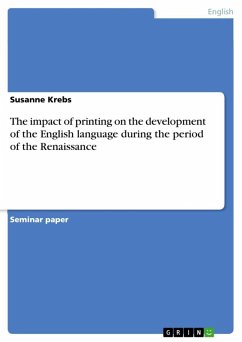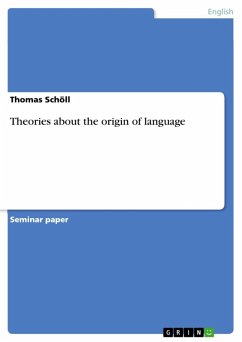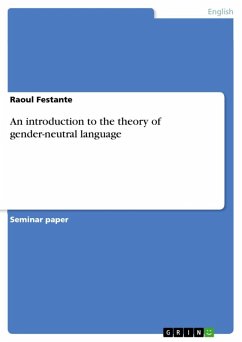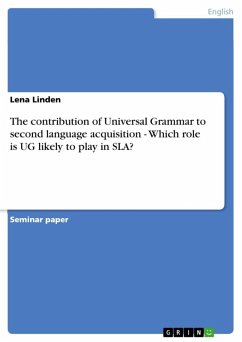
The impact of printing on the development of the English language during the period of the Renaissance (eBook, ePUB)
Sofort per Download lieferbar
Statt: 15,95 €**
13,99 €
inkl. MwSt. und vom Verlag festgesetzt.
**Preis der gedruckten Ausgabe (Broschiertes Buch)
Alle Infos zum eBook verschenkenWeitere Ausgaben:

PAYBACK Punkte
0 °P sammeln!
Seminar paper from the year 2004 in the subject English Language and Literature Studies - Linguistics, grade: 2,3, University of Koblenz-Landau (Anglistik), course: The Story of English, language: English, abstract: The 15th century must be seen as the age of innovation in Europe. For the spread of Renaissance culture as we know it today, several factors were decisive: advances in the fields of arts (e.g. architecture, painting and literature), science (e.g. geography, astronomy and medicine), economy (e.g. flourishing international trade) and of course technology, as the example of the printi...
Seminar paper from the year 2004 in the subject English Language and Literature Studies - Linguistics, grade: 2,3, University of Koblenz-Landau (Anglistik), course: The Story of English, language: English, abstract: The 15th century must be seen as the age of innovation in Europe. For the spread of Renaissance culture as we know it today, several factors were decisive: advances in the fields of arts (e.g. architecture, painting and literature), science (e.g. geography, astronomy and medicine), economy (e.g. flourishing international trade) and of course technology, as the example of the printing press shows. By definition "The printing press is a mechanical device for printing many copies of a text on rectangular sheets of paper." () This definition might give the impression we are dealing with a simple gadget and a rather unspectacular procedure, but until 1450, "the original method of printing was block printing, pressing sheets of paper into individually carved wooden blocks" (), which would not last very long because of the pressure exercised upon them during the process of printing. Knowing this, the invention of the printing press seems even more valuable, as the former method described here required a lot of energy, money and time and yielded a relatively ridiculous output. A less-costly method of producing printed material needed to be found and the former goldsmith Johannes Gutenberg (1398-1468) from Mainz in Germany is acknowledged as the pioneer in this field. He experimented with metal alloy and finally created movable types which could be used and reused for printing without the effect of wearing down like the wooden material. Immediately, the printing press had the effect of multiplying the output and cutting the costs of books, thus making information available to a much larger part of the population. So it can be said that the printing press initiated an "information revolution". Febvre and Martin (1998) point out that "In spite of Gutenberg's efforts to keep his technique a secret" and also despite some resistance from opponents of technological progress, "printing spread rapidly from its birthplace in Mainz to the various European countries. By 1480, only thirty years after their invention, printing presses were in operation in more than 110 towns throughout Western Europe, four of them in England alone. From that date it may be said of Europe that the printed book was in universal use."
Dieser Download kann aus rechtlichen Gründen nur mit Rechnungsadresse in A, B, BG, CY, CZ, D, DK, EW, E, FIN, F, GR, HR, H, IRL, I, LT, L, LR, M, NL, PL, P, R, S, SLO, SK ausgeliefert werden.













